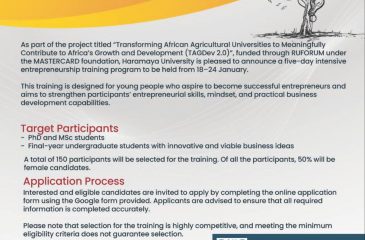Haramaya University Empowers Seed Producer Cooperatives for Enhanced Efficiency and Market Access
In a concerted effort to strengthen the seed production and marketing capabilities within the region, Haramaya University, through its ESP Project Unit, recently conducted a comprehensive training program for the Executive Committees of Seed Producer Cooperatives (SPCs) and their partners.
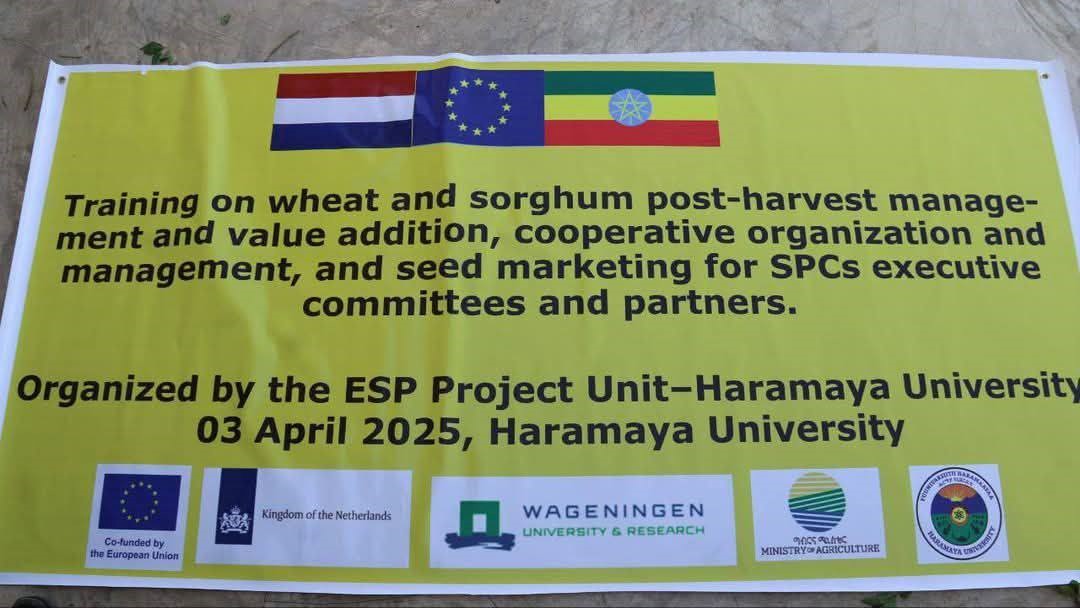
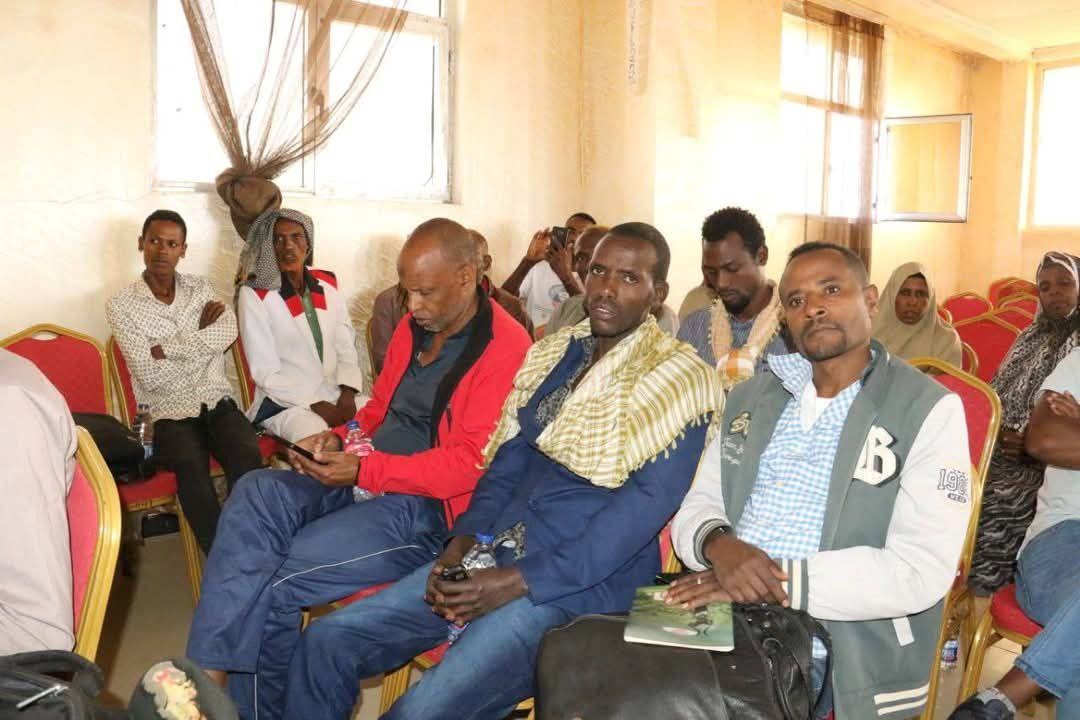 The training, held at the Afren Kello Union Hall in Maya City, focused on critical areas including post-harvest management of wheat and sorghum, cooperative organization and management, and strategic seed marketing.
The training, held at the Afren Kello Union Hall in Maya City, focused on critical areas including post-harvest management of wheat and sorghum, cooperative organization and management, and strategic seed marketing.
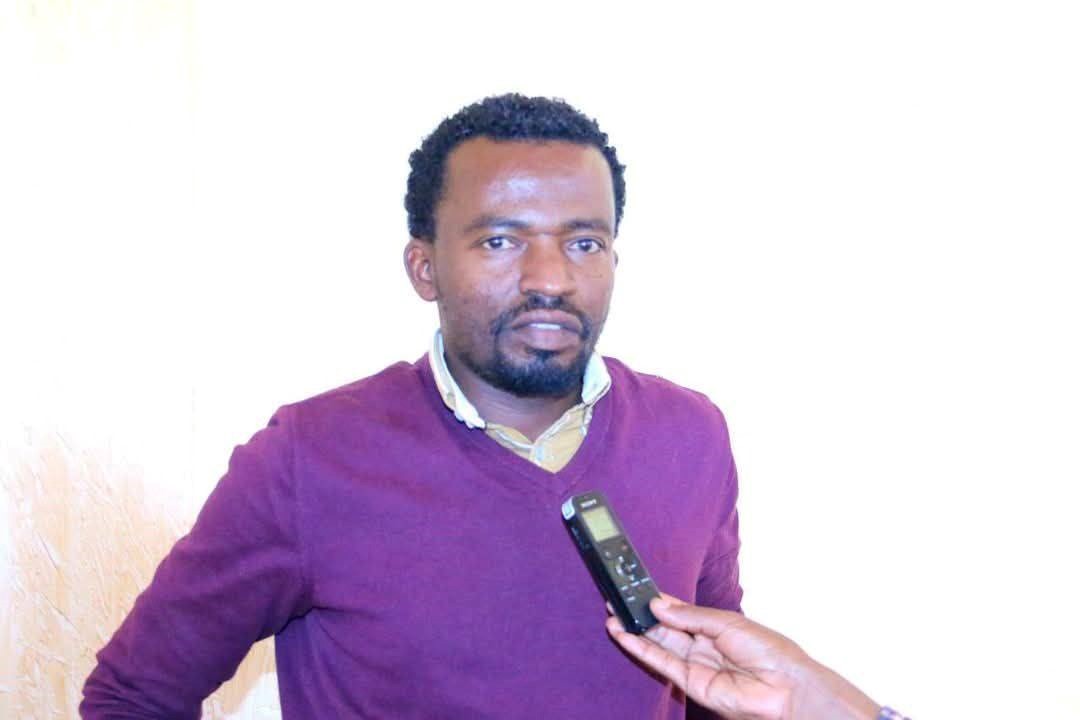 According to Mr. Kemal Kasim, Director of the Community Engagement and Industry linkage Directorate and project coordinator at Haramaya University, the capacity-building initiative aims to significantly enhance the efficiency and effectiveness of seed production and marketing undertaken by SPCs. The training specifically targeted executive committee members to equip them with the necessary knowledge and skills to optimize their operations.
According to Mr. Kemal Kasim, Director of the Community Engagement and Industry linkage Directorate and project coordinator at Haramaya University, the capacity-building initiative aims to significantly enhance the efficiency and effectiveness of seed production and marketing undertaken by SPCs. The training specifically targeted executive committee members to equip them with the necessary knowledge and skills to optimize their operations.
The event brought together 49 participants, comprising SPC executive committee members and partners representing four woredas in the East Hararghe Zone.
A significant portion of the training was dedicated to the post-harvest handling and storage of wheat and sorghum seeds, staple crops crucial for the food security and livelihoods of local farming communities.
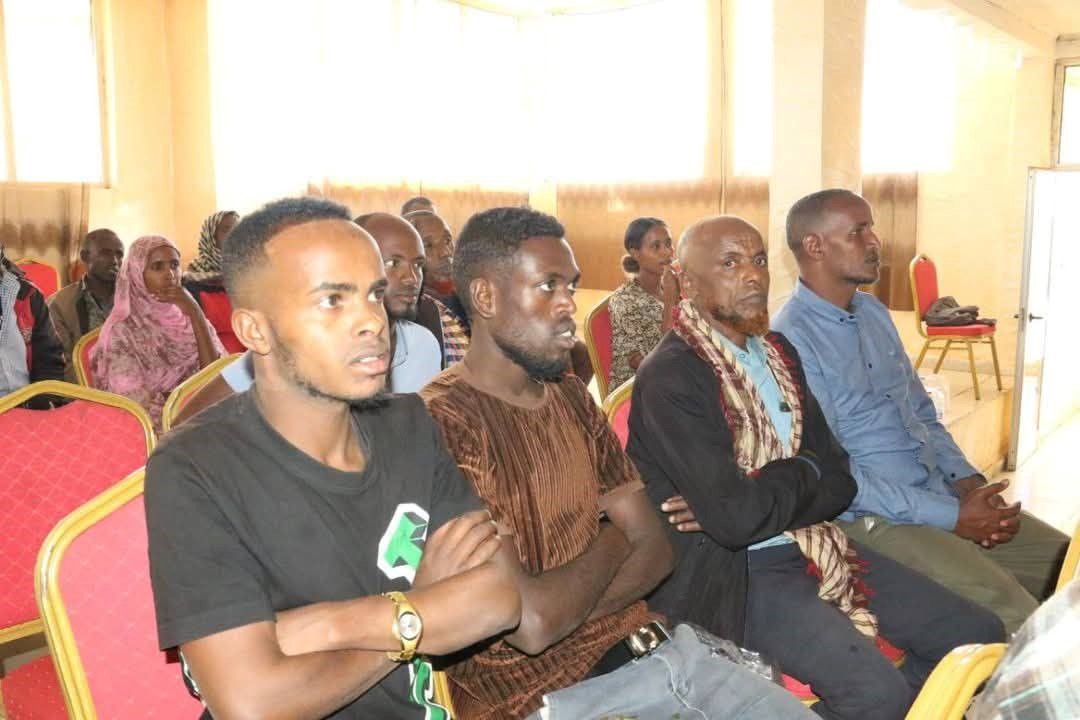 Participants received detailed guidance on best practices to mitigate post-harvest losses and maintain seed quality. The training also addressed common challenges in seed processing, packaging, and quality control, ensuring the availability of reliable and high-quality seeds for farmers.
Participants received detailed guidance on best practices to mitigate post-harvest losses and maintain seed quality. The training also addressed common challenges in seed processing, packaging, and quality control, ensuring the availability of reliable and high-quality seeds for farmers.
Equally important was the focus on cooperative governance and management skills. The training covered essential aspects such as effective leadership, fostering transparency, ensuring sound financial oversight, and promoting democratic decision-making within the SPCs. Interactive discussions encouraged participants to explore how robust organizational structures can build trust among members and ultimately improve the overall performance and sustainability of their cooperatives.
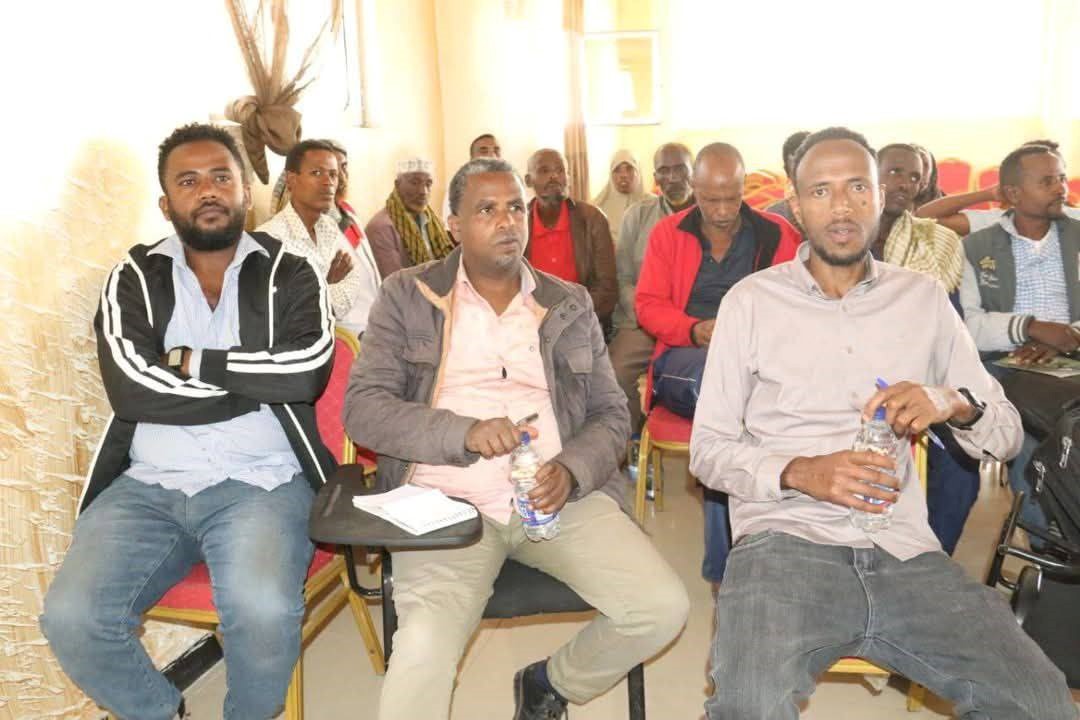 Furthermore, the training provided valuable insights into seed marketing strategies. Trainers highlighted key areas including market assessment techniques to understand demand, effective branding and packaging to enhance product appeal, strategic pricing, and the importance of strong customer relations.
Furthermore, the training provided valuable insights into seed marketing strategies. Trainers highlighted key areas including market assessment techniques to understand demand, effective branding and packaging to enhance product appeal, strategic pricing, and the importance of strong customer relations.
Participants were also introduced to value addition techniques, such as seed grading and labeling, to increase the competitiveness of their seeds and improve farmer adoption.
This initiative is a key component of the broader efforts by the ESP project to empower smallholder farmers and build a resilient seed system in the region through the strengthening of seed producers’ cooperatives.
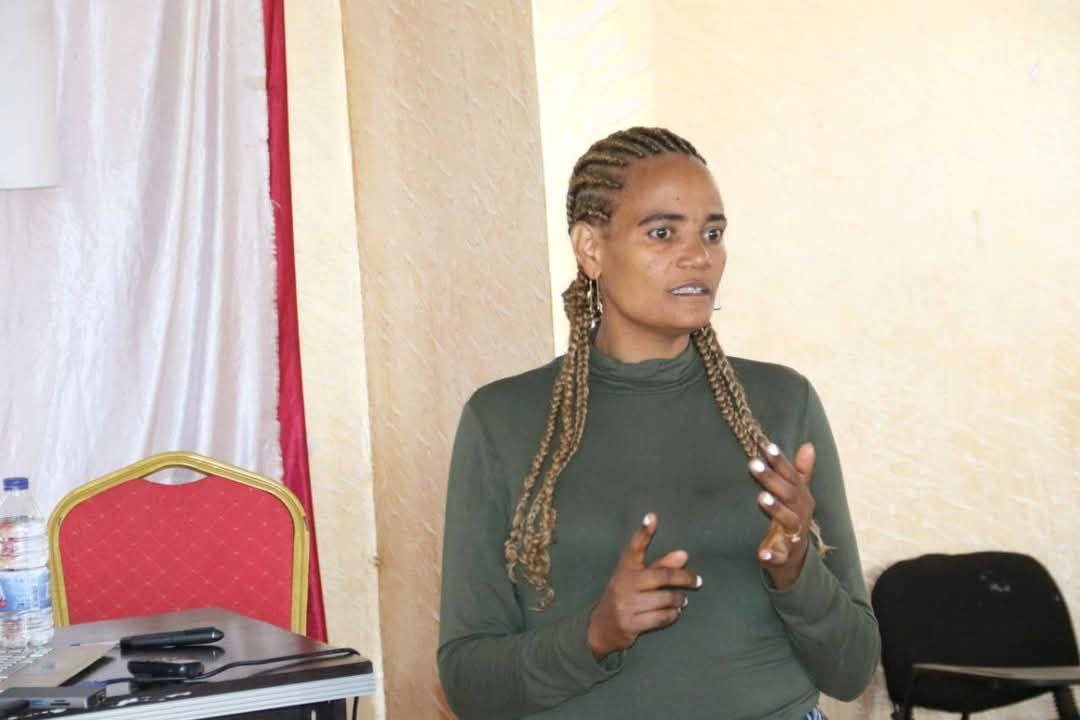 Mrs. Getenesh Girma, a representative of the East Hararghe zone cooperative office, lauded the university’s efforts, stating that the training provided by Haramaya University to seed producers and seed associations has significantly contributed to their ability to produce quality seeds in sufficient quantities for both the local community and beyond. She emphasized that Haramaya University has been a vital pillar in this development, providing crucial awareness and knowledge on quality seed crop production, control, conservation, and overall improvement.
Mrs. Getenesh Girma, a representative of the East Hararghe zone cooperative office, lauded the university’s efforts, stating that the training provided by Haramaya University to seed producers and seed associations has significantly contributed to their ability to produce quality seeds in sufficient quantities for both the local community and beyond. She emphasized that Haramaya University has been a vital pillar in this development, providing crucial awareness and knowledge on quality seed crop production, control, conservation, and overall improvement.
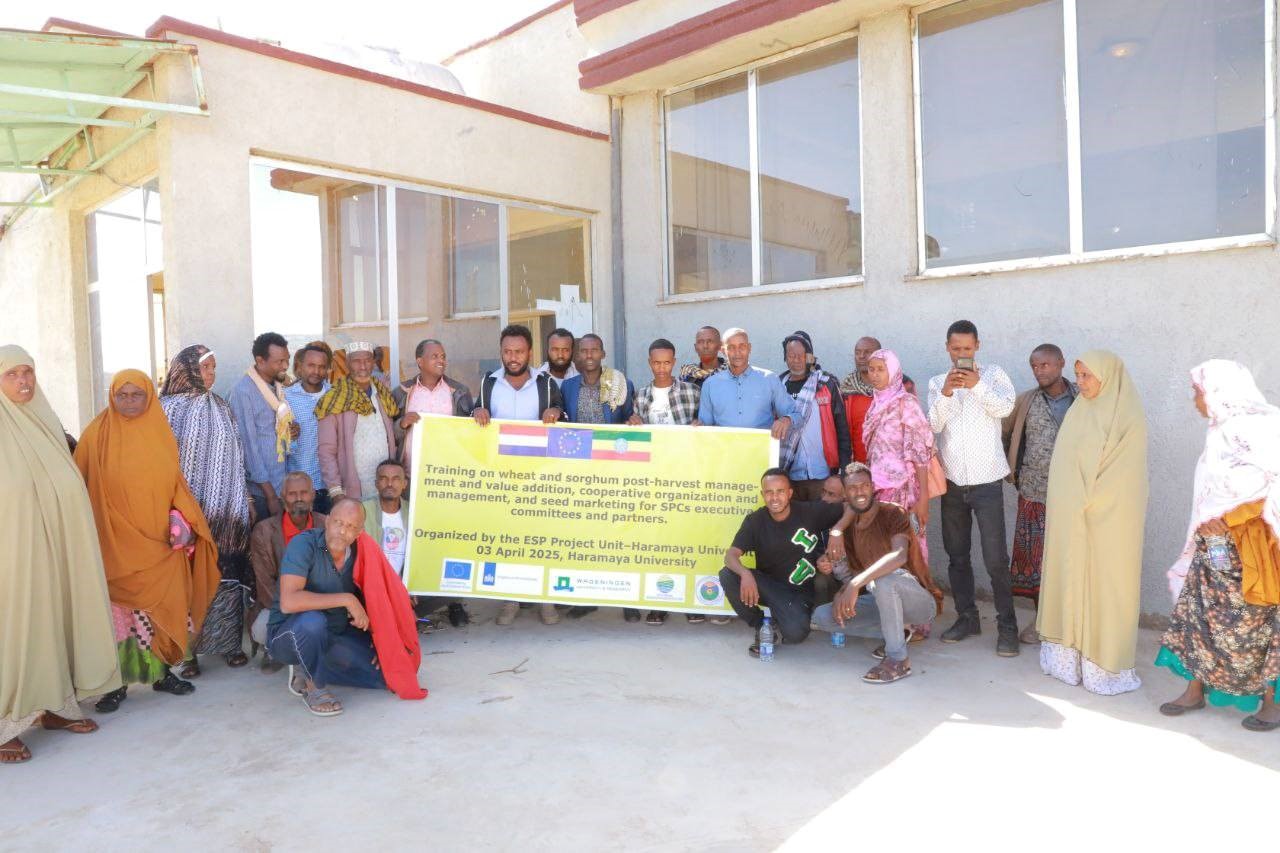 Participants representing various agricultural associations and development initiatives from Eegu, Gemechis, Lallise ifaa Din, Aw-sharif, Haja faji, and Bontu saba expressed their appreciation for the ongoing collaboration with Haramaya University in seed production. They affirmed their commitment to building stronger associations in the future by maintaining and enhancing the quality of their seeds throughout the production process. They acknowledged the fundamental importance of adhering to the standards and regulations of associations as the bedrock for their long-term sustainability and effectiveness.
Participants representing various agricultural associations and development initiatives from Eegu, Gemechis, Lallise ifaa Din, Aw-sharif, Haja faji, and Bontu saba expressed their appreciation for the ongoing collaboration with Haramaya University in seed production. They affirmed their commitment to building stronger associations in the future by maintaining and enhancing the quality of their seeds throughout the production process. They acknowledged the fundamental importance of adhering to the standards and regulations of associations as the bedrock for their long-term sustainability and effectiveness.
Reporter: Shemsedin Mohammed Photographers: Fuad Ahmed & Behailu Girma
Haramaya University Public & International Relations Directorate

